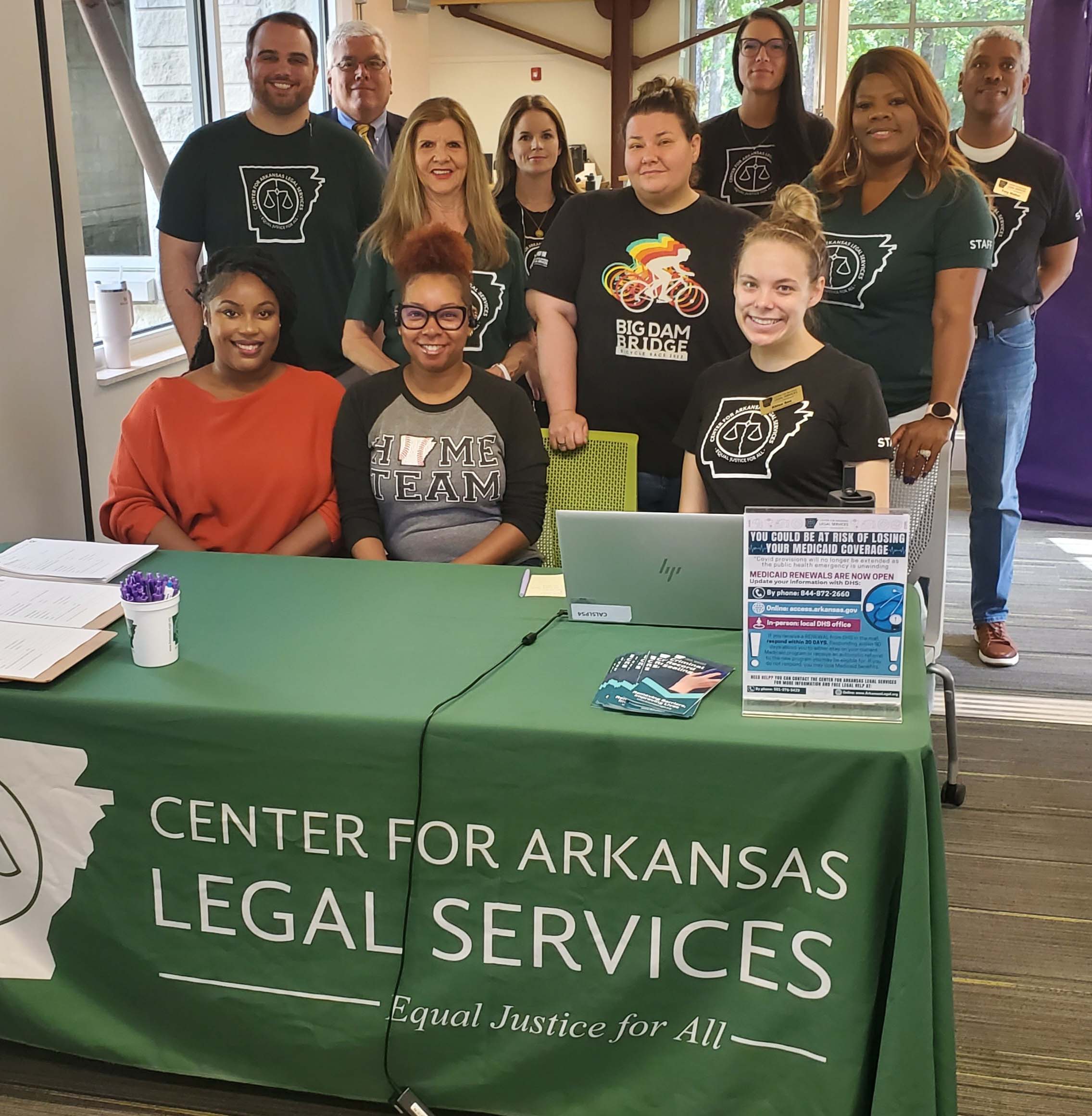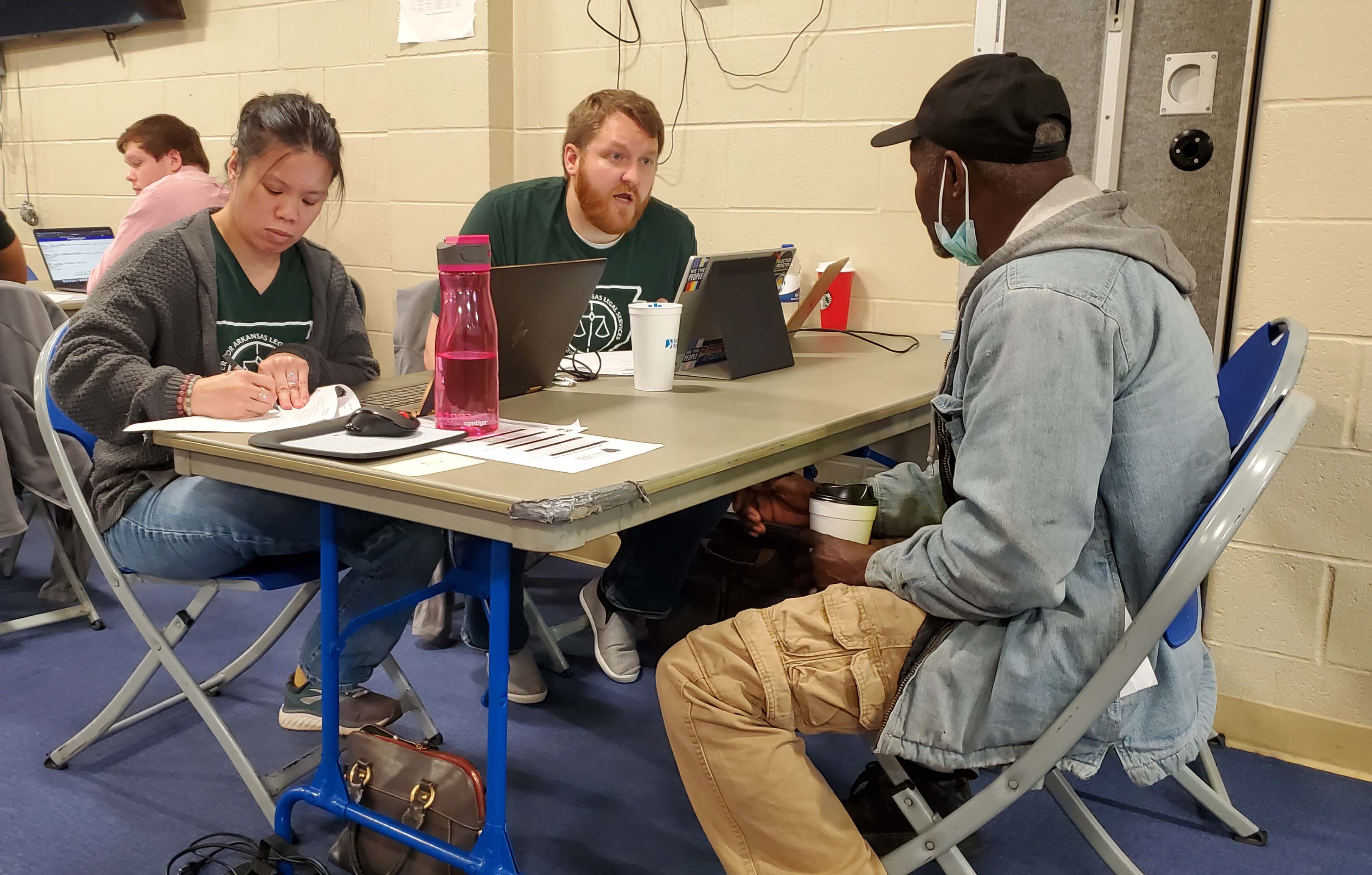The Center for Arkansas Legal Services
December 4-10, 2023
By Jay Edwards
Try and imagine you have been down a dark road, one that led to a conviction and perhaps even incarceration. Now you have paid your debt to society and are ready for just a chance to move forward and start a new and productive life. But there are barriers keeping you from moving forward, that can seem nearly impossible to overcome. Many Arkansans don’t have to imagine this scenario, for them it is reality, but help is available.
In 2016, The Center for Arkansas Legal Services (CALS), in partnership with the AR Department of Workforce Services and the Central AR Planning and Development District, began providing low-income Arkansans with a fresh start by sealing criminal records. It worked for people like Alayah, who had been hired for and subsequently dismissed from several jobs based on a misdemeanor conviction from 1996. She had twice tried to seal her record before finally contacting CALS, where one of their attorneys filed Alayah’s petition and represented her in a contested hearing. The petition was granted over the State’s objection and Alayah was subsequently hired for a new job as lead pre-k teacher making $20.55 an hour.
This is just one example of the many ways people who need another chance and a fresh start can receive aid from pro bono legal aid.
“Legal services are one of the most powerful tools anyone can have to improve their lives,” says Milo Mumgaard, who joined CALS in September 2022 as executive director, following a seven-year tenure as executive director of Legal Aid of Nebraska.
Besides having criminal records sealed, CALS and its staff of attorneys can guide people through the many areas of the complex world of legal mazes, which is especially difficult for low income individuals and households who cannot afford a lawyer.
“When I started last fall a lot of transitions were going on at legal services,” Mumgaard said. “The board and I decided to use this as a transitional year, where we would look at what more we could do as well as improve on what we already were doing for our low-income clients. We aren’t likely to shift around the kind of legal work we do, like for instance representing people who are facing the loss of their homes through eviction or foreclosure. It is an area where people are discriminated against. These are low-income clients who live in very bad conditions and there is a need for a lot of legal aid. Housing is a biggie for us.”
An example this year concerned the Greenbriar Apartments in Hot Springs, where tenants who live in the rent-controlled units were told they would have to pay extra for their window air conditioners or have them removed.
“Greenbrier is a good example of where legal services can step in and help more than one person at a time, who are experiencing the same kind of problem,” Mumgaard says. “Right in the middle of the hot summer the landlord decided he was going to put a fee on the tenants for their air conditioning. If they refused to pay, he was going to evict them. First of all, he cannot put on an additional fee like that, without going through a process, and second, you can’t just evict people or make them pay a fee they aren’t required to pay. So, in this situation, we are representing multiple people. We were able to go to court and get a judge to enter an eviction injunction that said, you can’t do that because of the contracts you entered into with the federal government on behalf of these people. So, we were able to keep the air conditioning on and keep folks in their apartments. But the landlord isn’t happy and the evictions continue, and we are representing them.”
CALS sees the importance in educating people on what rights they have as tenants and what legal process the landlord is supposed to follow regarding an eviction, which means going through the courts. Some landlords decide to take matters into their own hands and evict a tenant without a court order.
“We call those self-help evictions,” said CALS Communications Director Amber Quaid. “If the landlord does it the right way, they will go to court and get an eviction notice. Then the tenant has five days to respond.”
“Arkansas has some of the toughest laws in the country on that,” Mumgaard says. “Clients must act quickly, or they will be in a bind. We do a lot on getting the word out that if you are threatened with an eviction or get an eviction notice you need to act fast. And get advice from legal services.”
“This is something we see all the time. If you don’t pay your rent you probably are going to be evicted and there is not a lot the law can do to help you out. But for other things there are a number of laws that are not really used by people to their advantage, like contract law, deceptive trade practices law, housing laws and others, that insure people’s rights are protected.”
“We want to talk to people who have those kinds of conditions. The power of the law is sitting out there, go use it. Get it on your side. The way you do that is by having legal aid services on your side.”
Another suit was filed by CALS in November on behalf of four clients living in the Fred Parris Towers apartment complex at 18th and Broadway in Little Rock. Regarding that suit, on November 15, CALS posted this on their Facebook page:
“Our clients have stated that there are habitability issues within their apartments, which include mold, water leaks, holes in walls and ceilings, as well as pest issues. They are also claiming that there was removal and/or reduced safety and security protections that were in place at Parris Towers (such as removing security personnel and video cameras), which is believed to have resulted in over five hundred (500) calls/reports being made with the Little Rock Police Department. Some of the actions being alleged in the suit include Breach of Contract, Breach of Federal Fair Housing Act, and Breach of Arkansas Fair Housing Act.”
In September it was announced that CALS had been awarded a nearly $400,000 grant from Legal Services Corporation, a national nonprofit organization founded by Congress.
Caroline Sykes, who CALS brought on in March as the new development coordinator, says as important as these grants are, there are other outlets for resources to fund the important work the nonprofit is doing.
“I think they were limited in the past, thinking about just legal avenues,” Sykes says. “There are so many foundations and private or corporate grants who are willing and able to help with legal services. I think it was something they just hadn’t thought about. I am trying to expand on what they have been taking in, in the past, while trying to make new partnerships and relationships with other foundations. For instance we just received $80,000 from the Winthrop Rockefeller Foundation, which will be used to help keep kids out of foster care. If there is anything we can do to step in and help in areas of child support issues, domestic violence issues, guardianship, and so on, we want to do it. One of Rockefeller’s grant officers was a legal aid lawyer for us years ago. He appreciates what we do and is a huge advocate for us. We were very lucky to have that relationship, and will strive to keep it and ones like it going.”
“We recently acquired a database that basically data mines all the 990’s in the country. So I can find all the grants out there where they give money. If foundations don’t know about you, they don’t know to give.
We are trying to up our game in that regard.”
“Once people know about us,” Quaid says, “they ask, ‘Why haven’t we known about you?’ And once they know about the work we do, they support us. And in multiple ways, not just with money. Maybe someone doesn’t like the courtroom but they like writing briefs. Great, we can use them.”
The area that sees the greatest demand on the CALS team time is family law.
“We have to really constrict that down,” says Mumgaard, “because if we didn’t, we would be a family law firm. That is all we would be doing, working with people asking for divorces, child custody modifications, child support and so on. We only directly represent people who have domestic violence or abuse and neglect, those sorts of things. At least that is the goal.”
“We also provide legal services in the consumer area. We have a whole practice group there who respond to debt collection and bankruptcy and against those who go after their rights as a low income consumer. Like when they are buying a home or car.”
“Why do you think companies spend tens of millions of dollars on legal services? They are wise to do that. They are able to effectively avail their interests with a very sophisticated and well-paid legal counsel. Well, our clients are the same way. They are well served by having a sophisticated and high-quality legal services team working for them to advance their interests. For them, it comes down to this, ‘How do I get through this life of poverty and out of it?’”
“Having the power of the law with you can sometimes be a tremendous thing.”
1. Some of the attorneys and staff of the Center for Arkansas Legal Services during a criminal record sealing event offered to the public in partnership with the Dee Brown Library. (Photo by CALS Communications Director Amber Quaid)
2.




